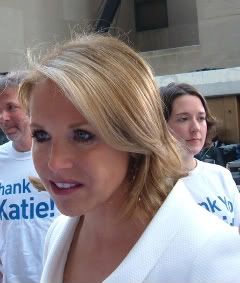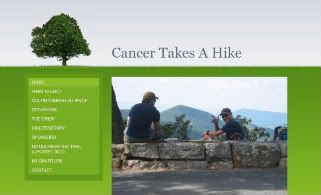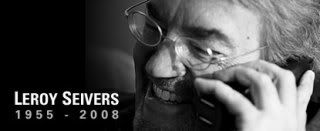My mom has always been great about sending me mail. When I was in college, she sent me at least one piece of mail a week. I probably never admitted to her how much that meant to me - being able to open my little mailbox in the student center and see a brightly colored greeting card or - even better! - a slip indicating that I had a package to pick up. But I'm sure she knew.
Now that I live across the pond, she has gotten back into her care package mode. Though these days the packages that the mailman crams through the slim slot in our front door contain more credit card bills and other grown-up mail than fun things. But her care packages are always thoughtful and always appreciated (I hope you're reading this, Mom!).
Yesterday, I received a big cushy envelope filled with newspaper clippings, bills (told you so), and the June 23 issue of
Newsweek magazine, which contains a lot of great articles about cancer. But I will get to those later. Also included in the package was a photocopy of another
Newsweek piece, written by Katie Couric back in April.
The article discusses the tenth anniversary of her husband Jay Monahan's death and how Katie chose to share some of the condolence letters she received a decade ago with her daughters, who were only 2 and 6 when Jay died of colon cancer.
I am a big, big Katie Couric fan. I have met her on a couple of occasions and she has always been gracious and lovely. The first time I met her was fairly soon after my stepdad's death. I had run a race in Central Park on a beautiful weekend morning, and my mom had come to the finish line. After the race we went to a greasy-yet-swanky-spoon brunch spot, the likes of which you could only find on the Upper East Side of Manhattan. And there was Katie, eating with a friend, in her exercise clothes with no makeup. My mom and I spent our entire meal debating about whether or not to say something to her, and had decided against it until we both got up to pay our tabs at the same time.
There we were, in line behind Katie Couric to pay for our diner brunch. My heart pounded as I decided to just go for it, and said, "Excuse me, Katie?"
Most of the conversation remains a blur. I remember that my mom and I quickly told her that we had lost my stepdad recently to colon cancer, so that she didn't think we were just quack fans. She immediately took off her sunglasses to make eye contact with us as my mom told her how much she admires the grace with which Katie handled her husband's death.
"You have been a model to me," my mom said. "It hasn't been easy."
Katie replied, "Yeah, it really sucks."
But not in a Debbie Downer way. In a way that sealed my respect for Katie Couric for life. It was a moment so genuine it gives me goosebumps to write about it now, years later. In that moment, two widows of men who'd lost their lives too soon to a disease that is all too preventable instantly and deeply connected. If only for a moment.
My mom and I were also at Katie's last day on the Today Show, and appeared on camera for fleeting seconds with a group of colon cancer survivors and advocates. It was a hoot!
 I like to call this one Katie and Me. Heh.
I like to call this one Katie and Me. Heh.
Anyway, this is all to say that I respect Katie a great deal, and so was excited to be able to read a piece of her writing.
I got through the article without crying, which was an achievement. Everyone who is affected by cancer has a different story to tell, and hearing a new story always makes you reflect on your own. As heartbroken as I remain about my stepdad John's death at age 64, attempting to fathom what it was like for Katie to lose her husband at age 41 - yes,
forty-one - is just impossible. To lose your life partner when your daughters are too young to remember him... it's just one of those things that should never happen to anyone.
Katie's story is one of many that fuel my passion to raise awareness about this disease in the hopes of eradicating it. It is not an easy story to hear, but I deeply admire that she is putting herself out there - as a mother, a widow, and a cancer advocate.
I wonder where my mom and I will be, what we'll be up to on the tenth anniversary of John's death. This July marks the fourth anniversary, so we have a long way to go. But I'm sure the time will fly, and I can only hope that when my mom and I inevitably reach that decade milestone, that we remain as full of grace and passion as Katie Couric.




